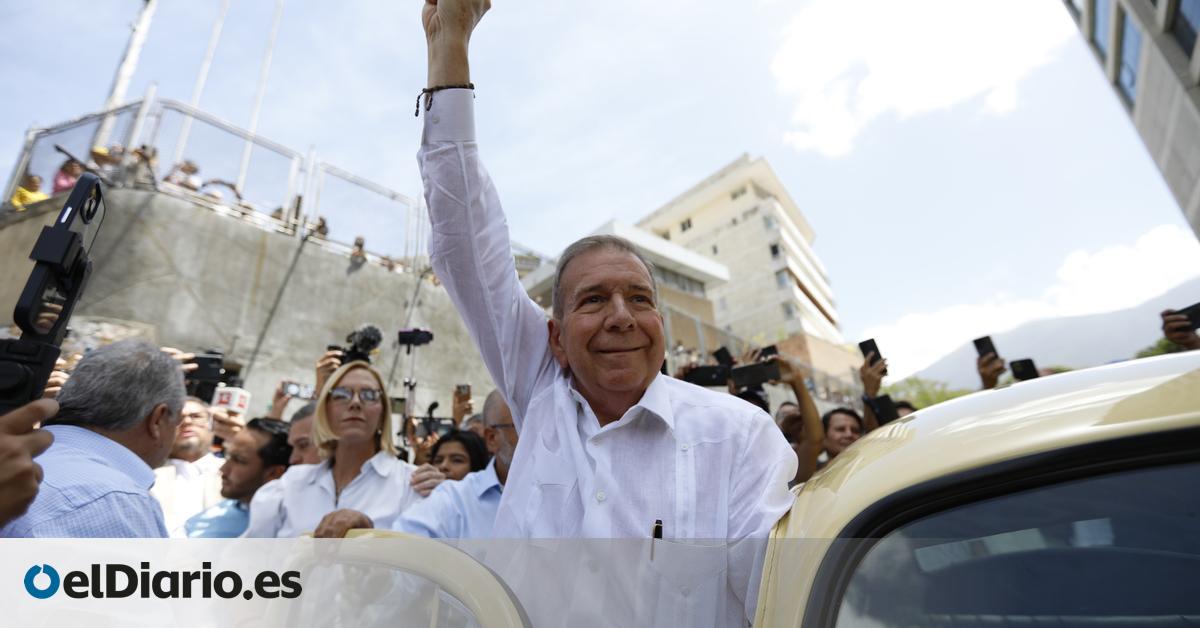
Venezuelan opposition leader Edmundo González has left Venezuela and is travelling to Spain this Sunday after the Spanish government granted him political asylum, the Foreign Ministry reported. “Edmundo González has taken off from Caracas heading for Spain on a Spanish Air Force plane.
The Spanish Government has provided the diplomatic and material means necessary for his transfer, carried out at his request,” said the Executive, which has reiterated its “commitment to the political rights and physical integrity of Venezuelans, especially political leaders.”
The departure of the opposition leader is the latest episode in the political crisis that has gripped the country since the presidential elections of July 28. While the Venezuelan justice system has declared the victory of President Nicolás Maduro, both the opposition and the international community are demanding to see official records that, they claim, reflect González Urrutia’s victory.
“I have been able to talk with [González Urrutia] “And as soon as he got on the plane he expressed his gratitude towards the Spanish Government and Spain,” said the Minister of Foreign Affairs, José Manuel Albares. “I told him that we are glad that he is well and on his way to Spain and I reiterated our commitment to the political rights of all Venezuelans.”
The High Representative of the European Union for Foreign Affairs, Josep Borrell, has declared that this Sunday is “a sad day for democracy” due to the need of the presidential candidate to request political asylum and accept the protection of Spain, despite the fact that he would be the winner of the elections in Venezuela “by a large majority” according to the available minutes.
The Dutch Foreign Minister also revealed on Sunday that González Urrutia had been secretly staying at the Dutch embassy in Caracas for more than a month, according to public television Nos, until September 5. Spain has only specified that it has granted asylum to the opposition leader after spending time at the residence of the Spanish Embassy in Caracas, without giving further details.
Venezuelan Vice President announces the departure of González Urrutia
Venezuela’s Executive Vice President Delcy Rodríguez also reported the departure of the opposition leader and confirmed that González is leaving Venezuela with a safe-conduct pass granted “for the sake of political peace and tranquility,” after spending “several days” sheltered in the residence of the Spanish Embassy in the Venezuelan capital.
“Today, September 7, opposition citizen Edmundo González Urrutia left the country. Having voluntarily sought refuge in the embassy of the Kingdom of Spain in Caracas for several days, he requested political asylum from that government,” the official wrote on her Instagram account.
Rodríguez explains that the governments of Venezuela and Spain have maintained the “relevant contacts” and, “in compliance with international law,” the opposition leader has been granted the corresponding safe conduct to be able to leave the diplomatic headquarters and travel to the European country.
“This conduct reaffirms the respect for the law that has prevailed in the actions of the Bolivarian Republic of Venezuela in the international community,” said the vice president, who assured that she will provide more information on the matter in the coming hours.
Recently, the Venezuelan president assured that the anti-Chavez leader had been “hiding” for several weeks, hidden “under guard” in a house in an affluent area of Caracas, and was preparing to leave the country for Miami. For the moment, the opposition coalition Democratic Unitary Platform (PUD) has not commented on the departure of its standard-bearer from the country.
Following the July 28 elections, in which the electoral body declared Maduro the winner, a political crisis broke out because the opposition claimed that González Urrutia won, a claim backed up by copies of “83.5% of the electoral records” that, according to the PUD, were collected by members and witnesses of the table, documents that the Executive claims are “false.”
The Venezuelan courts had ordered the arrest of González Urrutia on September 3 and the opposition leader had previously been summoned to testify accused of alleged crimes of usurpation of functions, disobedience, conspiracy and sabotage.
Tensions rise at the Argentine Embassy
While González travels to Spain, tensions with Argentina are rising in Venezuela after the Maduro government revoked the authorization it had granted to Brazil, at the beginning of August, to represent Argentina’s interests in Caracas – which included guarding Argentine diplomatic missions in Venezuelan territory – due to alleged planning of terrorist acts within the country by asylum-seeking opponents. A decision criticized by both the opposition and other countries, such as Argentina, Brazil, Costa Rica, Paraguay and Uruguay.
Since Saturday, the entrances to the official residence of the Argentine Embassy in Caracas have been surrounded by police, according to complaints by six opposition members seeking refuge at the embassy, who described the situation as a “siege.” One of the refugees, Magalli Meda, said on social media X that the police have “taken over” the “accesses” to the residence and that the electricity is “cut off,” something that was reported by Omar González, another of those seeking refuge on Friday night.
Argentina has rejected this unilateral measure and has warned the Venezuelan government that it must respect the Vienna Convention on Diplomatic Relations, which enshrines the inviolability of mission premises. “Any attempt to invade or kidnap asylum seekers who are in the official residence will be harshly condemned by the international community,” the Argentine government said. “Actions such as these reinforce the conviction that fundamental human rights are not respected in Maduro’s Venezuela.”
In the case of Brazil, a government source consulted by Reuters has stated that they have the guarantee that the Venezuelan authorities will not invade their embassy. The Brazilian government has reiterated that it will continue to defend Argentina’s interests until Javier Milei’s government decides whether it wants another state accepted by Venezuela to do so.
“A hero that Spain will not abandon”
Hours before the Venezuelan opposition leader boarded a plane to Spain, Prime Minister Pedro Sánchez told his party’s Federal Committee that González is “a hero” whom Spain “will not abandon” and defended his party’s role as “one of the main bastions against the far-right international that is sweeping the world.” All of this, he added, “fighting hoaxes, interference campaigns, protecting the security and integrity of activists, journalists and political leaders, wherever they are: in Russia, Palestine or Venezuela.”
For its part, Sumar insisted on Sunday on “a negotiated solution between the government and the opposition in Venezuela” after learning of the imminent arrival of González Urrutia in Spain and added that granting asylum to the opposition leader “does not imply recognition of any electoral result not observed internationally.” The PSOE partners in the coalition government insist that this negotiation “is more necessary than ever” and reiterate that they have always supported the demand for the “full and transparent” publication of the electoral results.
Source: www.eldiario.es

